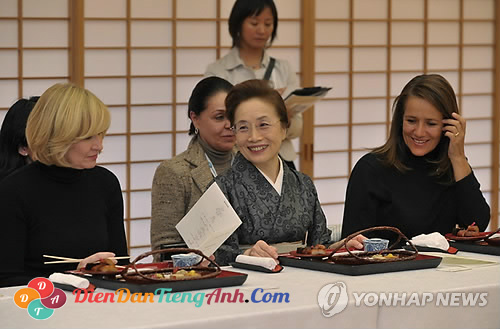6 phút từ vựng: What would they write about you?
6 phút từ vựng: What would they write about you?
Bạn đã bao giờ nghĩ đến việc bạn sẽ phản ứng thế nào khi có một người viết một cuốn sách về cuộc đời bạn - kể cả những bí mật, những lời chỉ trích chưa? Nobuko Kan - phu nhân của Thủ tướng Nhật Bản đã viết một cuốn sách về cuộc đời của chính chồng mình. Cùng tìm hiểu qua bài hội thoại này nào.
Bạn đã bao giờ nghĩ đến việc bạn sẽ phản ứng thế nào khi có một người viết một cuốn sách về cuộc đời bạn - kể cả những bí mật, những lời chỉ trích chưa? Nobuko Kan - phu nhân của Thủ tướng Nhật Bản đã viết một cuốn sách về cuộc đời của chính chồng mình. Cùng tìm hiểu qua bài hội thoại này nào.

Nghe bài hội thoại ở đây
Transcript
Yvonne: Hello, I'm Yvonne Archer and this is 6 Minute English…and thanks to Kate for joining me today! Hello, Kate.
Kate: Hello Yvonne.
Yvonne: Now, would you ever consider writing a book that spills the beans – reveals all the secrets about someone you know?
Kate: Oh no, I don't think I could do that. I don't think it's the right thing to do, although I know a lot of people do.
Yvonne: Well, Nobuko Kan is Japan's first lady – the wife of Japan’s Prime Minister - and she has written a book. It’s called: "What on earth will change in Japan now you are Prime Minister?"
Kate: Wow! I wonder what's in that? I'd love to read it.
Yvonne: Me too - but before we find out more, here’s your question, Kate: the title of Nobuko Kan’s book is twelve words long - but of course, it’s not the longest title in the world. Is the longest title of a book -
a: 160 words
b: 220 words or
c: 290 words?
Kate: I've got no idea I'm afraid, so I'm going to guess: b - 220 words.
Yvonne: We'll find out whether you're right later on. Now, with a title like: “What on earth will change in Japan now you are Prime Minister?” – I think we can expect Japan’s first lady to criticise a few things about her husband. Kate, can you explain for us what the verb ‘to criticise’ means?
Kate: Well, if we criticise something or someone, we make it known that we don’t like them and don’t approve of them. So, ‘a criticism’ is when we say what we think is wrong with something or someone, for example, the way they look, their actions or opinions.
Yvonne: Now, as we listen to part of a report by the BBC’s Roland Buerk in Tokyo, try to catch three criticisms that Japan’s first lady makes about her husband.
Roland Buerk
In a book about her husband, Naoto Kan, she writes: "I wonder, is it OK that this man is Prime Minister because I know him so well?" In a long list of his failings, she criticises his delivery of his first policy speech in parliament, as well as his fashion sense and inability to cook.
Yvonne: Kate, we heard how Japan’s first lady included a long list of her husband’s ‘failings’ in her book – the things he’s not successful in. But what was the first of his failings – so, the first ‘criticism’ we heard about?
Kate: Well, it was about his very first speech about policy in the Japanese parliament – about what the government is planning to do. Mrs Kan didn’t like ‘his delivery’ – so she criticised the way he made his speech.
Yvonne: Oh dear, so his own wife didn’t think the speech went very well. Now, the next two criticisms were quite personal, I thought. But one could possibly affect his job as Prime Minister while the other is unlikely to. What do you think, Kate?
Kate: Well yes, criticising the Prime Minister for ‘his fashion sense’ – the type of clothes he wears, is definitely personal. But image is important for famous people, so Naoto Kan really needs to dress appropriately for all occasions.
Yvonne: Hmmm – and what about the third criticism we heard about?
Kate: Oh yes – well, she criticises him for his ‘inability to cook’. And again, that’s a personal criticism and it’s more about Naoto Kan as a husband than about him as Japan’s Prime Minister.
Yvonne: Yes, I agree. He can still be a good Prime Minister, even if the whole world knows he can’t cook! Well, the Kan’s have been married for forty years, so is this book a sign of problems in their relationship? And how does the Japanese Prime Minster feel about his wife’s book? Here’s more from the BBC’s Roland Buerk in Tokyo.
Roland Buerk The Kans are as famous for her willingness to spar with him in public as for their enduring marriage. The Prime Minister has called his wife his "opposition in the home". Asked by reporters about her book, Mr Kan said he was too scared to read it.
Yvonne: So, no need to worry – the Kans have an ‘enduring marriage’ – it’s strong and has lasted a long time. And Mrs Kan is famous for wanting ‘to spar’ with her husband in public – she’s likes to have gentle arguments with him in front of everyone. But, the Prime Minister has a few views of his own.
Kate: Yes, he calls his wife his” opposition in the home’ – so Mrs Kan is like a parliamentary opponent who lives with him. She criticises and questions what her husband does at home.
Yvonne: Hmm – it sounds like she keeps him on his toes, doesn't it?
Kate: Yes, it does.
Yvonne: But I really liked Prime Minster Kan’s comment on his wife’s book – “"What on earth will change in Japan now you are Prime Minister?"
Kate: Yes, well when it was published, the Prime Minister said he was too scared - or afraid to read it.
Yvonne: So Kate, if someone talked about you in a book, would you be too scared to read it?
Kate: Yes, I think I would actually. I think I wouldn't like to see someone else's opinion of me. I hope no one will put me in a book.
Yvonne: Hmm – well, we'll have to see. Time will tell. OK, it’s time now for the answer to today’s question. Kate, how many words did you say are in the longest ever title for a book?
Kate: Well, I took a guess at this one and said 'b' 220 words.
Yvonne: The answer actually was 'c' – 290 words.
Kate: 290 words?! How did that many words fit on the page?
Yvonne: You'd be surprised.
Kate: I have to see that one.
Yvonne: Yes, the book was written in 2007 by an Italian man and it was about PR.
Kate: Public Relations.
Yvonne: That's right. But that's all for today’s 6 Minute English; thanks for joining us. Goodbye.
Kate: Goodbye.
Tổng hợp từ vựng mới trong bài
- spills the beans
tells or reveals all the secrets
- the title
the name of a book, what it is known as
- to criticise
to make known that we don't like or approve of something
- delivery
the way or style in which something is done; here, the way a speech is given
- fashion sense
a way of dressing which shows that someone is aware of the latest styles available, what suits them and what is most appropriate for each occasion
- image
the way someone looks and presents themselves to other people
- to spar
to fight or argue in a gentle, playful and unaggressive way
- keeps him on his toes
helps to make him behave and speak in the best way possible
- published
made available to the public, available to buy
- PR
abbreviation for 'public relations' - the work of creating and keeping a good relationship between an organisation and the general public











Bình luận